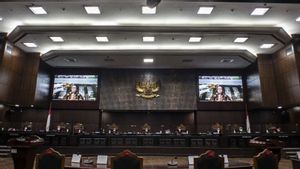JAKARTA - The Panel of Judges of the Constitutional Court (MK) stated that Law Number 11 of 2020 concerning Job Creation is contrary to the 1945 Constitution of the Republic of Indonesia and has no conditionally binding legal force.
Constitutional Law expert Refly Harun said, reflecting on the Constitutional Court's decision, the government, including the Indonesia House of Representatives, must learn valuable lessons. Since the beginning of this law, there have been many mistakes made by the government-House of Representatives.
"This is a lesson for the government which is reckless in making laws, including making the job creation law, making a Government Regulation in Lieu of Law, the Minerals and Coal Law which recklessly does not include the public in the formation process. Youtube @Refly Harun launched Thursday, November 25.
Apart from participation, one indicator of the government's reckless nature can be seen from the draft of the Job Creation Law, which was not clear until it was ratified. This means that the public does not have valid information regarding the substance contained in the law because it does not have an official draft.
SEE ALSO:
"I am sure that no one has comprehensively read the Job Creation Act, which contains many articles, as well as legal experts who are not able to read all of them and analyze them all", said Refly.
Refly added that the Job Creation Law should not contain too many articles or rules.
For example about the ease of investing or licensing. According to Refly, if the government wants to focus on targeting investment or licensing, then the job creation law is the same.
"So all the laws that are collected are only related to licensing, but if everything is changed that is our problem. This is a black market law-making process", quipped Refly.
In the decision that was read out, the Chief Justice of the Constitutional Court, Anwar Usman, stated that the Job Creation Law was still valid until the legislators, namely the government and the House of Representatives, made improvements to the formation by the grace period as determined in the decision.
Furthermore, the Constitutional Court ordered the legislators to make improvements within a maximum period of 2 years after the decision was pronounced by the Constitutional Court. And, if within that time limit the legislators do not make improvements, the Job Creation Act becomes permanently unconstitutional.
The English, Chinese, Japanese, Arabic, and French versions are automatically generated by the AI. So there may still be inaccuracies in translating, please always see Indonesian as our main language. (system supported by DigitalSiber.id)


















